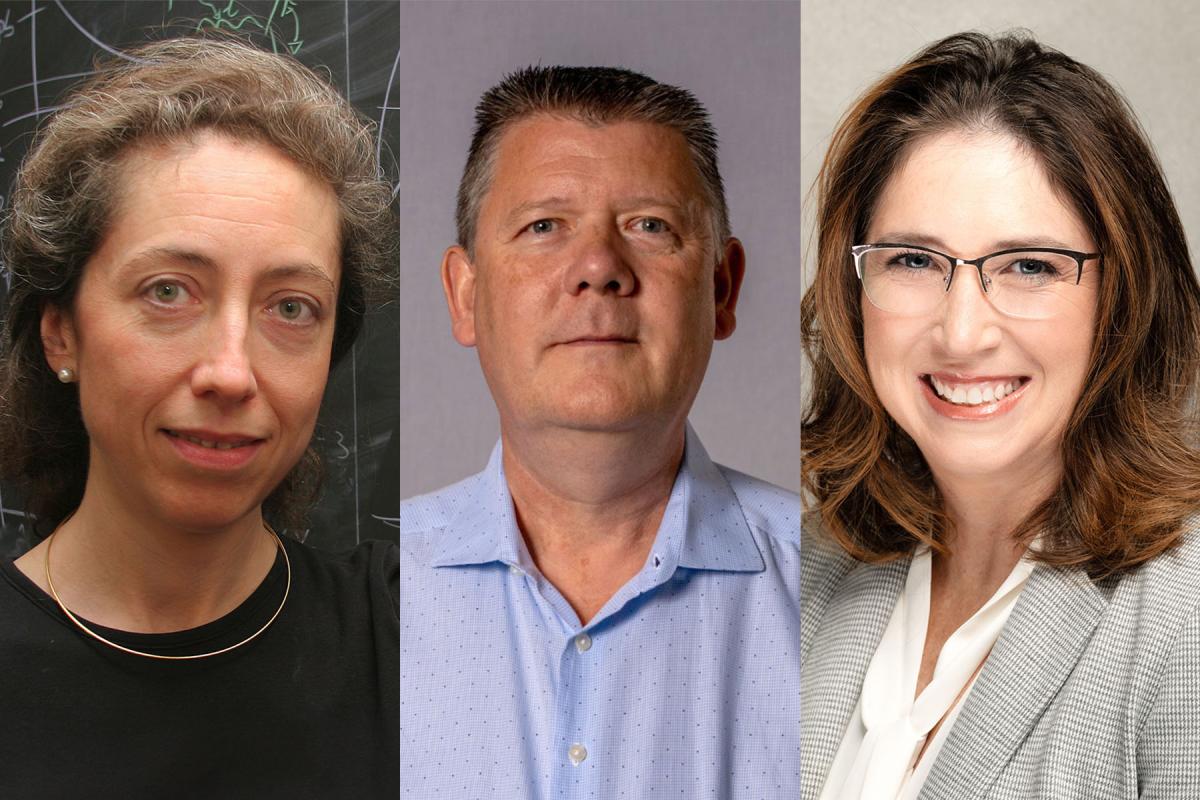Three FSU faculty named fellows of the Academy of Science, Engineering and Medicine of Florida

Three Florida State University researchers have been named fellows of the Academy of Science, Engineering and Medicine of Florida (ASEMFL).
Professor of Nursing Lisa Hightow-Weidman, Professor of Physics Stephen Hill and Professor of Physics Laura Reina are all a part of this year’s class that will be inducted during the Annual Meeting of the Academy to be held in Orlando on Friday, Nov. 1, and Saturday, Nov. 2.
“Professors Hightow-Weidman, Hill and Reina are extraordinary faculty members with long track records of outstanding contributions to science and research,” said Vice President for Research Stacey S. Patterson. “We are incredibly proud of their accomplishments and congratulate them on being named to the Academy of Science, Engineering and Medicine of Florida.”
Founded in 2018, the academy informs Floridians of current and future science, engineering and medicine issues and addresses the associated challenges. The organization provides unbiased expertise for issues that concern the state and helps facilitate scientific interactions.
To be selected for ASEMFL membership, individuals must live or work in Florida and be a member of the National Academies of Science, Engineering and Medicine, or be nominated by a current ASEMFL member and have an outstanding record of accomplishments, national and international recognition.
“Professors Hightow-Weidman, Hill and Reina are extraordinary faculty members with long track records of outstanding contributions to science and research. We are incredibly proud of their accomplishments and congratulate them on being named to the Academy of Science, Engineering and Medicine of Florida.”
— Vice President for Research Stacey S. Patterson
Hightow-Weidman is a Distinguished and Endowed McKenzie Professor and Associate Dean for Research at Florida State University’s College of Nursing, where she also directs the Institute on Digital Health and Innovation.
“I am deeply honored to be inducted as a Fellow of the Academy of Science, Engineering and Medicine of Florida,” she said. “This recognition is a testament to the collective efforts and contributions of many, and I am grateful for the opportunity to continue advancing our shared mission of innovation and excellence.”
Hightow-Weidman is an internationally renowned expert in the development, implementation and evaluation of digital health interventions to address the HIV Care Continuum for adolescents and young adults. She has been at the forefront of translating evidence-based science into digital applications, specifically through the inclusion of game-based elements, self-monitoring and tracking and provision of support to increase engagement and impact health behavior.
She completed her M.D. at the University of Virginia School of Medicine and pursued residency training in internal medicine at Stanford University. Hightow-Weidman completed an infectious diseases fellowship at the University of North Carolina Chapel Hill, where she earned her master’s in public health with a focus on epidemiology.
Hill is a physicist known for his extensive contributions to magneto-optical spectroscopy and electron paramagnetic resonance (EPR). In addition to serving as a member of the FSU physics faculty, Hill serves as director of the Electron Magnetic Resonance user program at the National High Magnetic Field Laboratory.
“It is truly an honor to have been elected fellow of such a prestigious organization,” Hill said. “I very much look forward to contributing to the important work that the Academy carries out on behalf of the State, its universities, industries and educational organizations.”
Hill’s research focuses on high-field spectroscopy, exploring quantum phenomena in magnetic and superconducting systems, and developing advanced EPR instrumentation. He has received numerous awards, including the title of FSU Distinguished Research Professor in 2022, and was selected to serve on the National Academies of Sciences, Engineering and Medicine Committee on Identifying Opportunities and the Interface of Chemistry and Quantum Information Science. Most recently Hill has been awarded by the ESR Group of the Royal Society of Chemistry and Bruker Corporation as the Bruker lecturer for 2025, acknowledging his pioneering contributions to EPR.
Reina is a physicist specializing in theoretical particle physics with emphasis on high-energy collider physics. She is a member of the European Organization for Nuclear Research Large Hadron Collider Higgs Working Group, where she has served in various leadership positions and is currently serving on its Theory Advisory Committee. She has recently served as theory convener of the Energy Frontier during the 2021 Snowmass process of the Division of Particles and Fields of the American Physical Society, aimed at defining the science arguments that will inform future directions in high-energy particle physics. She is a fellow of the American Physical Society and of the American Association for the Advancement of Science. She is an FSU Distinguished Research Professor and a recipient of the Joseph F. Owens endowed professorship.
“I am truly honored by this recognition and very grateful for the support that I have received from the FSU administration, my colleagues in the Physics Department and a lot of amazing students during my career,” she said. “I have greatly enjoyed being part of the FSU community and seeing it reaching new heights year after year.”
Reina received her doctorate from the International School for Advanced Studies in Trieste, Italy, in 1992. She completed her postdoctoral research at the University of Brussels and Brookhaven National Laboratory.
Her research is globally recognized for its contributions to understanding elementary particle physics, particularly emphasizing the effects of perturbative QCD corrections in collider physics, where she is recognized for her work on Higgs-boson and heavy-quark physics. Her expertise extends to flavor physics and effective field theory explorations of physics beyond the Standard Model.
For more information, visit the Academy of Science, Engineering and Medicine of Florida.
